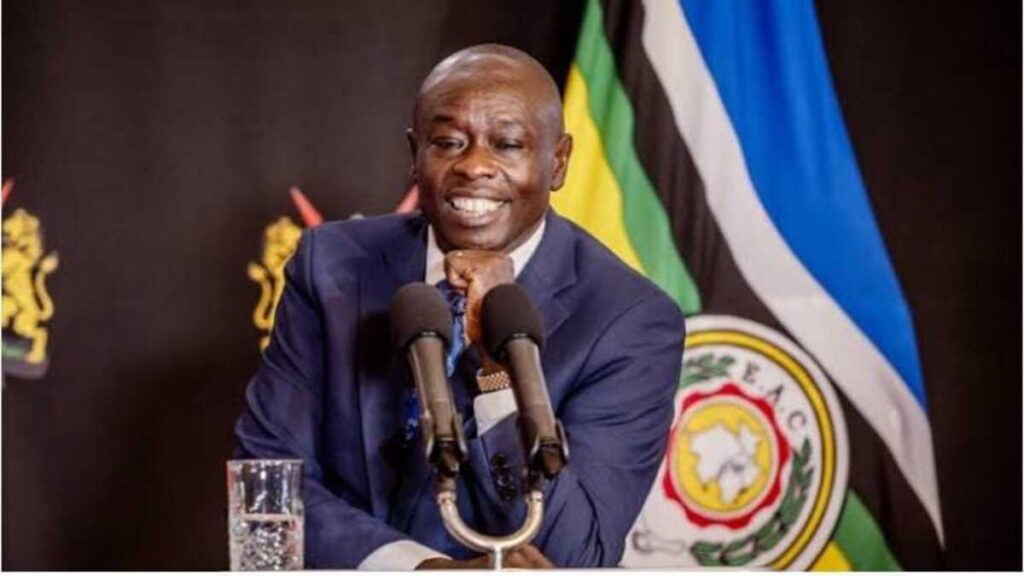Kenya’s former Deputy President, Rigathi Gachagua, was removed from office in a historic impeachment vote, marking the first such action against a deputy president since Kenya adopted its 2010 constitution.

Former Deputy President,Rigathi Gachagua.Courtesy photo
The Senate voted on Thursday, 17 October 2024, to impeach Gachagua after finding him guilty of five out of eleven charges brought against him. The dramatic development has sent shockwaves through Kenya’s political landscape and highlighted growing tensions within the country’s leadership.
In a significant move that underscores the severity of the political crisis, President William Ruto has already nominated Interior Minister Kithure Kindiki as Gachagua’s replacement. Parliament has subsequently approved this appointment.
The charges that led to Gachagua’s removal included engaging in ethnically divisive politics and intimidating judges. The Senate also found him guilty of gross violation of the constitution. However, he was cleared of six other charges, including corruption allegations.
Speaking on Sunday, 20 October, a defiant Gachagua launched a scathing attack on President Ruto, describing him as “vicious” and cruel. The impeached Deputy President expressed disbelief at what he perceives as betrayal from someone he helped ascend to the presidency.
“I am shocked that someone I helped become president could turn against me so viciously,” Gachagua said during his address. His comments reveal the deep personal and political rift that has emerged between the two former allies.
The political fallout took a more serious turn with Gachagua claiming that his security detail had been withdrawn and his entire staff forced to take compulsory leave. In a stark warning, he stated that President Ruto should be held responsible if any harm befalls him or his family members.
The relationship between Gachagua and President Ruto has deteriorated significantly since their successful 2022 election campaign. During that period, Gachagua played a crucial role in securing victory by mobilising support from the vote-rich Mount Kenya region.
Despite the impeachment, the former Deputy President has maintained his innocence and rejected all allegations against him. He has repeatedly insisted that the charges are politically motivated and had promised to “fight to the end” rather than resign from his position.
The impeachment process created an atmosphere of political uncertainty in Kenya, with potential implications for the country’s stability. It represents a significant shift in the power dynamics within Kenya’s government and could have far-reaching consequences for regional politics.
Legal experts are now watching closely as Gachagua has indicated his intention to challenge the impeachment through the courts. This legal battle could potentially extend the political crisis and create further uncertainty in Kenya’s political sphere.
The appointment of Kithure Kindiki as the new deputy president signals President Ruto’s determination to move forward despite the political turbulence. Kindiki’s nomination has already received parliamentary approval, indicating strong support for this transition within the legislature.
However, Gachagua’s supporters view the impeachment as a politically motivated move designed to remove a powerful figure from the Mount Kenya region from the deputy presidency. This perception could potentially affect regional political dynamics and voter support in future elections.
The historic nature of this impeachment cannot be understated. As the first successful impeachment of a deputy president under Kenya’s 2010 constitution, it sets a significant precedent for future political accountability in the country.
The international community is closely monitoring these developments, given Kenya’s strategic importance in East Africa. The political stability of Kenya has implications for regional security, economic cooperation, and diplomatic relations throughout East Africa.
As this political drama continues to unfold, questions remain about its long-term impact on Kenya’s democratic institutions and political stability. The coming weeks will be crucial in determining whether the country can navigate this transition smoothly or face prolonged political uncertainty.
The impeachment also raises important questions about the future of Kenya’s political alliances and the stability of executive partnerships in the country’s governance structure. It may prompt political leaders to reassess their approaches to coalition-building and power-sharing arrangements.
For now, Kenya faces a period of adjustment as it adapts to these significant changes in its executive leadership. The success of this transition will largely depend on how well the country’s political institutions manage the aftermath of this historic impeachment.